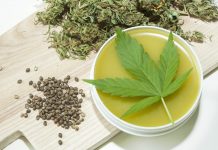Serpent River First Nation – The first issue of Growth and Prosperity: Indigenous Cannabis and Hemp is now online at www.bimaadzwin.ca/magazine. “Our Peoples must be included in this emerging multi-billion dollar industry,” said publisher Isadore Day, CEO of Bimaadzwin. “This magazine aims to inspire and educate our Peoples, and all Canadians.
“Since cannabis was legalized on October 17, both Canadians and Indigenous Peoples are still coming to terms with all the impacts – legal, social, safety, health, and economic. With the lifting of Prohibition on the sale and consumption of cannabis, we have now entered into a new economic era. This ‘green’ economy has the potential of generating billions of dollars for everyone – entrepreneurs, communities, and all levels of governments.
This magazine will help answer questions such as: ‘Where do First Nations and Indigenous Peoples fit into this new economy? Is it simply a matter of jurisdiction? Can our communities control the licensing, production, and sale of cannabis and hemp? Will our community members benefit from long-term employment in the cannabis industry? Will they feel confident that the products they produce and sell are safe for family and friends to consume?’
At the end of the day, the federal and provincial governments will formally approve projects under their respective regulatory regimes – this should not mean a closed door to First Nation opportunities. One example is Seven Leaf Cannabis in the Mohawk Nation of Akwesasne. Seven Leaf spent almost four years consulting with both leadership and community members. Not only does it have community approval, but Seven Leaf is the only First Nation owned licensed producer of medical cannabis with Health Canada approval.
Other communities — from Tsuu’tina in Alberta to Tyendinaga in Ontario – are exercising their Treaty Rights and jurisdiction when it comes to the production and sales of cannabis. All the First Nation Chiefs in Nova Scotia have already told their provincial government that they intend to exercise their own jurisdiction on cannabis sales by October 2019.
In the meantime, both Health Canada and Indigenous Services Canada admit that much more should have been done to prepare Indigenous Peoples for the legalization of cannabis. In fact, the federal government is still very committed towards including our Peoples in all aspects – legal, social, safety, health and economic. Federal officials will be participating at the 2nd National Indigenous Cannabis and Hemp Conference, February 19-21, in Ottawa. Health Minister Ginette Petitpas-Taylor will be a speaker.
“Much work needs to be done in the months to come in order to include our Peoples in this emerging economy,” concluded Chief Day. “You will see some of what’s begun in the pages of the first edition of this magazine.”







